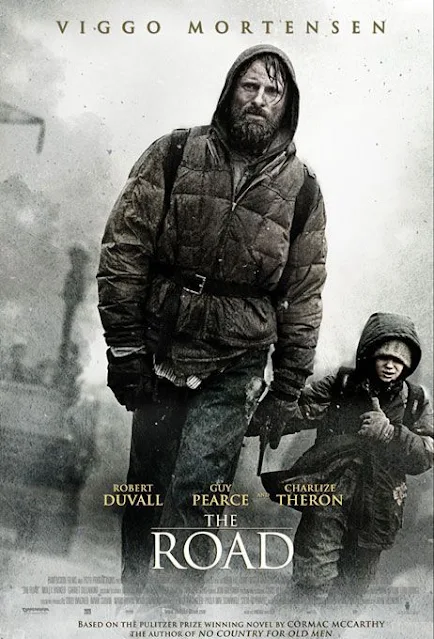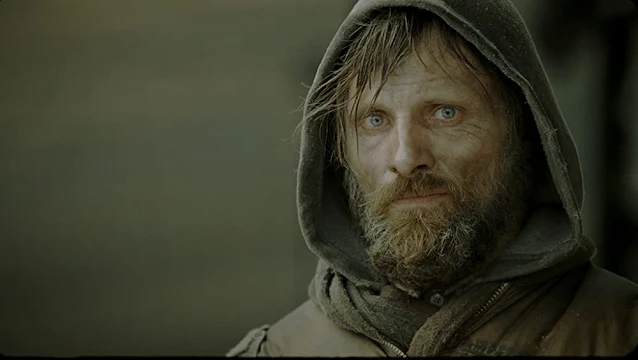The Road, directed by John Hillcoat and adapted from Cormac McCarthy's novel of the same name, is a haunting and thought-provoking post-apocalyptic film that delves into the depths of human survival and the unbreakable bond between a father and his son. Starring Viggo Mortensen, Charlize Theron, and Kodi Smit-McPhee, the film is a powerful exploration of humanity in the face of despair.
Reviewers Rating: ★★★★☆
Set in a bleak, desolate world devastated by an unspecified cataclysmic event, The Road follows an unnamed man (Mortensen) and his young son (Smit-McPhee) as they navigate a barren landscape, searching for safety and sustenance. From the very beginning, the film establishes a sense of dread and hopelessness as the father and son encounter horrifying scenes of devastation, including ashen landscapes and remnants of civilization reduced to ruins. These visual depictions effectively convey the harsh reality of their world, emphasizing the magnitude of their struggle.
Viggo Mortensen's portrayal of the father is nothing short of remarkable. He meticulously captures the character's physical and emotional exhaustion, constantly on edge as he guides his son through treacherous encounters with marauding gangs, cannibals, and the ever-looming threat of starvation. Mortensen's performance showcases the father's fierce determination to protect his child, even in the face of unimaginable horrors. The audience witnesses his unwavering love and sacrifices as he shields his son from the atrocities they encounter, showcasing the depths of his humanity amidst the surrounding darkness.
Kodi Smit-McPhee delivers an equally impressive performance as the innocent yet resilient son. Throughout the film, the audience witnesses his transformation from a sheltered child to a young survivor, forced to confront the brutal realities of their existence. Smit-McPhee skillfully portrays the son's vulnerability and wide-eyed wonder, juxtaposed with moments of emotional strength and resilience. The horrors they encounter, such as encountering a gang of cannibals who resort to extreme violence to survive, further accentuate the son's growth as he grapples with the harsh truths of their world.
Charlize Theron, though having limited screen time, manages to leave a lasting impact as the mother. Her few appearances provide glimpses into the depth of her despair and internal struggle. Through haunting flashbacks, the film reveals the mother's desperation and eventual surrender to the bleakness of their situation. Theron's portrayal emphasizes the toll that hopelessness can take on one's spirit, adding another layer to the exploration of the human psyche in dire circumstances.
Director John Hillcoat successfully captures the rawness and brutality of McCarthy's novel, creating a visually stunning and atmospherically oppressive world. The desaturated color palette, combined with the desolate landscapes, mirrors the bleakness and despair of their journey. Hillcoat's decision to prioritize character development and emotional resonance over action and spectacle allows the audience to fully immerse themselves in the story and connect with the characters' plight. The director skillfully balances moments of quiet introspection with intense and harrowing sequences, such as the father and son's encounter with a group of desperate survivors, highlighting the fragility of humanity and the constant threats they face.
One of the film's greatest strengths lies in its ability to ask profound questions about the nature of humanity. The Road explores themes of survival, morality, and the lengths we go to protect those we love. The film does not shy away from showcasing the darkness and depravity that can emerge in desperate times. For instance, the father and son come across scenes of cannibalism, witnessing the depths to which some individuals have fallen in their struggle for survival. However, amidst the horrors, the film also highlights the resilience of the human spirit and the capacity for goodness and compassion.
The father's unwavering love for his son and his constant efforts to teach him kindness and empathy become beacons of hope in an otherwise desolate world.
While The Road is an undeniably powerful film, it is not without its flaws. At times, the deliberate slow pacing may test the patience of some viewers, reflecting the arduousness of the characters' journey. Additionally, the film's ambiguous ending, where the fate of the characters is left open to interpretation, may leave some yearning for more concrete answers. However, this open-ended conclusion also serves to deepen the film's thematic exploration, leaving audiences with lingering questions about the nature of hope and survival.
In conclusion, The Road is a harrowing and emotionally gripping film that showcases the strength of the human spirit in the face of unimaginable adversity. With its outstanding performances, striking visuals, and profound exploration of the human condition, it stands as a thought-provoking masterpiece of post-apocalyptic cinema. The film's depiction of the horrors encountered by the man and child serves to underscore the intensity of their journey and the depth of their resilience. Although it may not appeal to all audiences due to its bleakness and contemplative nature, those who appreciate a deeply affecting and introspective experience will find The Road to be an unforgettable journey.

















